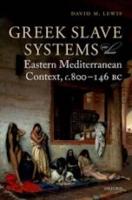
OUP (2018) h/b 372pp £75.00 (ISBN 9780198769941)
This is the most important contribution to our understanding of Greek slavery since the volume of essays, Slavery in Classical Antiquity: Views and Controversies, put together by Moses Finley in 1960. All subsequent discussions of Greek slavery will have to start from L.’s book. They will have to do so because L. is prepared to rethink the conventional claims made about slavery in Greece—claims to the uniqueness of what happened in Greece, claims about the difference between chattel slavery and e.g. Spartan helots, claims about what constitutes a slave society, and, indeed, claims about what is a slave. Many of the individual moves made by L. have been anticipated, as he acknowledges, by other scholars, but he is the first person to put this picture together.
L.’s prime target is Finley’s view of Greek slavery. For L. a slave is a person subject to purchase and sale; since a person either is or is not subject to purchase and sale there can be no status between slavery and freedom, and since the criterion for being a slave is being susceptible to sale, there need be no developed notion of freedom in order to have a fully developed slave system. Since helots and similar local groups were subject to sale and purchase they should be reckoned straightforwardly slaves. Slave purchase and sale is a familiar feature of Homeric epic, particularly in the Odyssey, and the key place of slavery there and in Hesiod’s Works and Days shows that slavery did not ‘rise’ only after Solon, and that there was no move from ambiguous statuses between freedom and slavery to pure slave status. Slaves were equally present and crucial in the societies of the Near East (in Assyria, Babylonia, the Persian empire, and also in Carthage), and there is no reason to think Greece and Rome peculiar among ancient societies, nor is the notion of dividing a slave society from a society with slaves very helpful, though slave use comes in varying degrees of intensity.
Much of this revisionism is obviously correct and helpful, and L. has many insightful discussions, particularly over the evidence for how widespread slave ownership was beyond the elite, and over evidence for the use of slaves in agriculture (where he favours widespread use, despite the evidentiary problems). The insight that he takes over from Harper, that equal slave prices for men and women (as opposed to higher prices for women) is a good indicator of a major economic role for slave labour, is an important one and enables him to say something about the economic place of slave labour in near-eastern societies where explicit evidence is lacking.
L. is sensitive to questions of ‘emic’ (actor’s own) and ‘etic’ (our observers’) categories, and himself draws attention to the fact that what categories are useful depends upon what question we are asking, but he often writes as if the latter were not the case, or as if the narrow range of questions in which he is interested is the only range of questions to be asked.
His insistence that slaves are those who are bought and sold is one example. Just as in the modern world to insist that there are no slaves in the UK because no one is bought and sold is to adopt a political position which minimises the importance of practical constraints upon people’s freedom to change their employment, so to dismiss from consideration those in the classical world who were termed douloi not because they were liable to sale but because they were politically constrained, is a political decision. If our question is not about legal status but about freedom, then there is no doubt that, on the one hand, helots enjoyed freedoms (e.g. with regard to family life) not enjoyed by the general run of slaves in Athens, and on the other that in some political regimes those not liable to sale were nevertheless far from ‘free’.
L. is aware that legal status is not everything, and that status has a great deal to do with performance, but he fails to see how this might impinge upon his overall enterprise. It is neither wrong to think about slavery as domination, nor wrong to ask what slaves contributed to the economy, only wrong to think that these are the only ways of understanding slavery. As L. himself hopes, this book should be the beginning of a new stage in the debate about slavery, not the end of the old debate.
Robin Osborne
